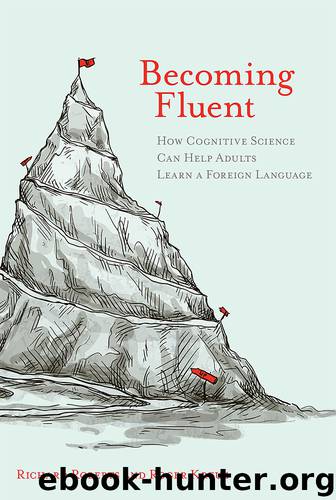Becoming Fluent by Richard M Roberts & Roger Kreuz

Author:Richard M Roberts & Roger Kreuz [Roberts, Richard M & Kreuz, Roger]
Language: eng
Format: epub
ISBN: 9780262029230
Publisher: MIT Press
Published: 2015-05-15T04:00:00+00:00
7
Making Memories …
The Workings of Working Memory
Have you ever wondered about the length of telephone numbers? When the engineers working for the Bell Telephone Company created the modern phone system in the 1950s, they had to consider a variety of factors. If the numbers were too short, there wouldn’t be enough of them to go around. If they were too long, people would make mistakes when they used them. (Remember that this was when calling someone meant repeatedly turning a dial with your index finger. It could take several seconds to dial a number, so mistakes were costly in terms of time wasted.) Most importantly, however, if the numbers were too long, people wouldn’t be able to remember them. But how long is too long?
Let’s try a little memory experiment. Before reading any further, hand this book to a family member or friend, and ask her to follow the instructions shown below:
Please read the following numbers out loud. Speak the numbers at a rate of about four per second, and try to keep the pauses between each number the same length:
3 7 2 9 5 8 1 6 0 2 7 4
Immediately after you finish, ask that the numbers be repeated out loud. Now hand the book back (and thank you!).
This is called a digit span task. Chances are, you weren’t able to repeat the entire twelve-digit sequence. Most people are able to remember the first few numbers, but then, somewhere around the middle of the list, their memory collapses like a house of cards. Whatever the span of one’s memory is, it seems to be fewer than twelve numbers.
Cognitive scientists have made use of this digit span test for a variety of purposes, but we’ll just focus on estimates of its size for now. George Miller, who was in fact one of the very first cognitive scientists, famously referred to the number of items that can be held in memory as “the magical number seven, plus or minus two.”1 And in fact, the engineers at Bell Labs made use of Miller’s research when they decided that seven digits offered the best balance between phone number length and people’s memory limitations.
But just as some people claim that age is simply a number, it turns out that digit span is rather arbitrary as well. A moment ago, you probably failed in your attempt to recall a twelve-digit number that you’d just heard. Now we’re going to give you another twelve-digit number, and ask you to recall it. And we confidently predict that you’ll do much better with this one (here’s a hint: think about dates from history):
1 4 9 2 1 7 7 6 2 0 0 1
How did you do? If you realized that this twelve-digit sequence is composed of the years of three important events in American history, then you could think about it as:
1492, 1776, and 2001
This sequence isn’t just a meaningless string of digits. The first four digits are also the year of Columbus’s discovery of the
Download
This site does not store any files on its server. We only index and link to content provided by other sites. Please contact the content providers to delete copyright contents if any and email us, we'll remove relevant links or contents immediately.
Periodization Training for Sports by Tudor Bompa(8271)
Why We Sleep: Unlocking the Power of Sleep and Dreams by Matthew Walker(6722)
Paper Towns by Green John(5190)
The Immortal Life of Henrietta Lacks by Rebecca Skloot(4587)
The Sports Rules Book by Human Kinetics(4386)
Dynamic Alignment Through Imagery by Eric Franklin(4216)
ACSM's Complete Guide to Fitness & Health by ACSM(4060)
Kaplan MCAT Organic Chemistry Review: Created for MCAT 2015 (Kaplan Test Prep) by Kaplan(4012)
Livewired by David Eagleman(3772)
Introduction to Kinesiology by Shirl J. Hoffman(3769)
The Death of the Heart by Elizabeth Bowen(3620)
The River of Consciousness by Oliver Sacks(3604)
Alchemy and Alchemists by C. J. S. Thompson(3520)
Bad Pharma by Ben Goldacre(3427)
Descartes' Error by Antonio Damasio(3277)
The Emperor of All Maladies: A Biography of Cancer by Siddhartha Mukherjee(3162)
The Gene: An Intimate History by Siddhartha Mukherjee(3098)
The Fate of Rome: Climate, Disease, and the End of an Empire (The Princeton History of the Ancient World) by Kyle Harper(3067)
Kaplan MCAT Behavioral Sciences Review: Created for MCAT 2015 (Kaplan Test Prep) by Kaplan(2986)
